Staff Book Reviews by Genre: Science Fiction
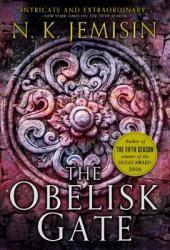
I previously reviewed the first book in this series, The Fifth Season (http://ppld.org/book-reviews/fifth-season). This was a strong second entry, and on reflection I ended up liking it even more than the original book. The plot is far more linear than in The Fifth Season, but there are still unexpected twists and turns, and for me the characters really came into their own here. You will see some old, familiar faces along with a number of new additions to the cast from regions of the world we hadn't previously been exposed to. There was one character in particular whose story-line took a surprising turn that caused me to do a complete 180 on how I saw them. For me, it hit all the right notes: deeper world-building, strong characterization, and a complex plot that held up to closer scrutiny.
If you haven't finished the first book, the next part of this review will include minor spoilers. The Obelisk Gate picks up where The Fifth Season started, with Essun discovering her murdered son just as the Season hits. While the previous book then went back and forth in time to explore how she had arrived at that point, this one moves us into the future as she sets off in pursuit of her husband (Jija) and daughter (Nassun), hoping to rescue Nassun before she meets the same fate as her brother. The chapters alternate between Damaya/Syenite/Essun's journey and her daughter's, with the odd interlude featuring someone else. The narration is still in its distinctive second person format, but in this book we finally learn who the speaker is. In my opinion, Jemisin answered just enough questions from the first book while still leaving mysteries for the finale, and I can't wait for the third and final entry in the series (projected release in 2017). Highly recommended to lovers of fantasy!
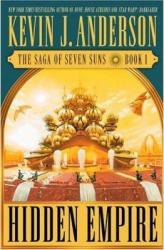
Hidden Empire is the start to the "Saga of the Seven Suns" series by Kevin J. Anderson, an author of dozens of Bestselling and award-winning sci-fi books. If you haven't heard of Kevin J. Anderson, it's probably because a great deal of his writing is done for other pre-existing franchise licenses (Star Wars, Dune, movie novelizations, etc...) where the author’s name tends to less noticed. Having had no previous familiarity with the author myself, I took a gamble on this one when I passed by his publisher’s booth at Denver Comic Con, and had a bit of money still burning in my pocket. I've been pleasantly surprised and now that I’m 3 books in, I think the series is holding up fantastically.
Hidden Empire tells the story of human ingenuity turned reckless by greed. When the Terran Hanseatic League ignites a gas giant into the first man-made star, they awaken a slumbering threat, and inadvertently start a war that threatens to destroy all of human civilization. The enemy is ruthless and unimaginably powerful, and worse yet, the various factions of humanity are divided by their own conflicts and prejudices.
Saga of the Seven Suns is a classic space opera of galactic proportions with a close focus on its characters. It skips the focus on justifying realistic technology that is common in "hard" sci-fi, and though the plot revolves around a war, it is not "military" sci-fi either, in that it's less about space marines and more about xeno-archaeologists and politicians. This is a people-centric story all the way, with the spotlight on the struggles of the individual characters as they each try to navigate the webs of intrigue, conflicting cultural values, and ancient secrets that surround them. Think the grand scale of Star Wars mixed with the plot style of Game of Thrones, featuring a varied cast of Point-of-View characters whose stories conflict, intersect, and illustrate the plot from different perspectives.
Speaking of Game of Thrones, did I mention that this 7 book series has already been completed and fully published? You get all the thrill of binge-reading a sweeping saga that will keep you entertained for months, without have to wait around for 5 years for the resolution to that torturous cliffhanger! There's also a handy glossary at the back of the book to help you keep track of the different people involved in this intricate story.
Note: This book is not to be confused with Hidden Empire by Orson Scott Card. While Card's name is likely more recognizable, Anderson's book was published 2 years prior.
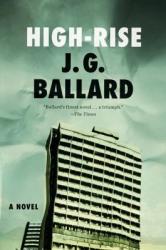
High-Rise (1975) begins with one of the most memorable first lines I’ve ever read, "Later, as he sat on his balcony eating the dog, Dr. Robert Laing reflected on the unusual events that had taken place within this huge apartment building during the previous three months". Laing is a new tenant in a futuristic high rise apartment building on the outskirts of London. The high rise is a microcosm containing restaurants, playgrounds, a swimming pool, and even its own supermarket. There is social order: the wealthiest tenants occupy the building's upper floors with the best views, while the middle-class tenants reside in the lower half of the building, constantly at the mercy of falling champagne bottles from the upper floors. Before long, tensions arise between the tenants of the upper and lower floors. Alternating between Laing and another tenant, Richard Wilder, we witness first-hand the deterioration of ethics and social order within the high rise. Elevators are commandeered, rooms are barricaded, alliances are formed, and blood is shed. Little by little, the layers of human behavior are peeled back, exposing a terrifyingly animalistic core at the heart of the high rise tenants.
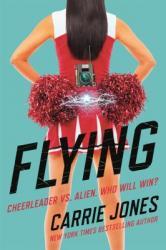
Mana is going along in her perfectly normal life as a high school teenager with two best friends, one of whom is a boy and crush interest. All of a sudden a guy (codename China) taking out an alien, who happens to be hiding out as a cute boy at her school, interrupts a basketball game, and Mana’s world drastically changes. She finds out her mom is also an alien hunter and has disappeared, presumably kidnapped by aliens because of a chip with information she has. To top it off, Mana starts having some weird abilities, like being able to jump really high and do crazy gymnastic stunts. The rest of the book has Mana, her friends, and China on a mission to find Mana’s mom and save the world.
I really liked Carrie Jones’s series, Need. This was definitely a different kind of book. It was lighthearted and, at times, a bit silly, but overall, still a nice, light, fun read.
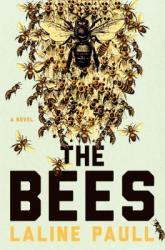
My first thought when this book was recommended to me was, “Bees? Is that metaphor? What do the bees stand for?” NOPE. This book is literally about bees. But not in a nonfiction, documentary kind of way. Here we have a novel in which we discover the world of bees personified.
Enter our main character, Flora 717. She was born the lowest of the low: the sanitation worker bee. Ugly, underappreciated, but unlike her fellow floras, she can speak. One of the higher levels of bees, a priestess to the queen, immediately takes notice of her oddities and experiments with her in roles not typical to a flora.
Flora 717 finds herself in almost every aspect of bee life at some point of her journey through the hive, uncovering secrets as she learns, grows, experiences the most profound loss, and transcends to the highest joys. The ordinary life of these black and yellow creatures we see and often fear is re-imagined into a relatable tale that pierces the veil between bees and humans. Though humans play very little role in the book, the bees exhibit many characteristics of humanity.
The tone of this book can be a bit dark at times with graphic imagery, but I highly recommend it.
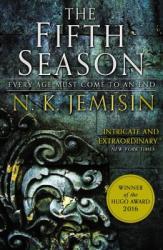
I loved this book. I've been looking for a new fantasy series for a long time now, but I haven't come across anything recently that's caught my eye. I almost gave up on The Fifth Season too, in part because the narration is in second person, which I found jarring at first, and in part because Jemisin drops you in the middle of the action with little explanation and no hand-holding. It took me a few chapters to get into the story and figure out what was going on, but I'm glad I stuck it out because the plot and characters ended up being great. Despite what I just said, I think it's almost better to go into this blind, but I'll try to describe it without giving too much away.
The continent our characters live on, "The Stillness," is a post-apocalyptic hellscape. There is near-constant seismic activity that triggers a new catastrophe (called a "Fifth Season") every few centuries -- sometimes in the form of massive crop-failures, sometimes in the form of volcanic eruptions, sometimes massive earthquakes that destroy whole regions (she includes a helpful appendix of these disasters if you're curious). In this world, there is a group of people known as orogenes (or more derogatorily as "roggas") who have some degree of control over seismic activity -- they can "sess" earthquakes, and, with training, prevent them from being too destructive. But they're also powerful, extremely dangerous, and widely despised -- many people kill their own children when they discover what they are, and it's often a race against time to see if a Guardian (their mysterious and sinister keepers) can arrive to collect the child before the family or the community has killed them. The plot isn't chronological; it moves around from chapter to chapter in order to tell three stories at three points in time: 20-odd years ago, when a young girl is taken to the capital to be trained as an orogene; some 10 years after that when a mid-level orogene goes off on a mission with her senior to investigate a disturbance in a coastal community; and "now," in the immediate aftermath of the latest apocalypse, when we follow a woman who is struggling to cope with her son's murder just as the quake hits.
I'm not going to say that it's an entirely original idea, but I think the execution was solid and I loved the dialogue and cast of characters. There's no lack of action, but Jemisin also takes the time to dig into her characters' emotional lives, and after a while the use of "you" starts to fade into the background. There's a strong focus on discrimination, both in terms of how orogenes are viewed in society and in terms of the treatment of subordinate nations and peoples by the Sanzed Empire that has conquered the continent. A lot of fantasy is set in pseudo-Europe (and often just pseudo-England), so it was refreshing to read something more diverse, and there's a wide variety of representation in terms of race, gender, and sexuality throughout. I would give this 4.5/5 stars if that were possible, but since it isn't I've left it at 4. It wasn't perfect, but it was a very strong start to the series, and I look forward to starting the second book, The Obelisk Gate, which just released this September. I would definitely recommend this to fans of fantasy.
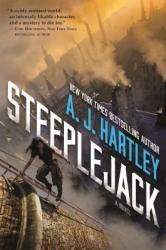
Anglet is a steeplejack, a person who climbs buildings for a variety of work related reasons (chimney work, retrieval, the building of things, etc.). One day, at the end of a shift, she discovers a dead body on the ground. As being a steeplejack is quite dangerous, she isn't completely alarmed at first, until she realizes that the person did not die of natural causes - he had been stabbed in the back. After that, she takes it upon herself to solve the murder mystery as well as a few other mysteries that crop up along the way.
I feel like I should've liked this book more than I did. The beginning is extremely slow, but only due to the author having to do some serious world-building, which is something I often like. The world itself was pretty cool. It's a newly colonized version of South Africa, which made for a unique setting. Actually, the racism/discrimination bits were so well done as to be hard to read. The main character is likable. She's that lovely combination of fierce and vulnerable that is common in YA, but rarely successfully pulled off. Hartley pulls it off. He knows what he's about - this book was extremely well written.
So why didn't I like it? I'm kind of asking myself the same question here, but my overall feeling was definitely just "meh". I think that, for me, the book lacked any real tension or emotional impact. I liked Ang, but I never really cared that much about her, or anyone else in the story. I definitely didn't care about Berrit, the murder victim. Actually much is made about how NO ONE cares about Berrit and his life was one that wasn't going to be worth living anyway, so...who cares who murdered him, really? Aside from a few terrifying scenes featuring her would-be rapist/boss (and a few other emotional but spoilery scenes) the book went from action scene to action scene with no real emotional impact, and without feeling like it was fast paced. Somehow, in the midst of all of the action, the book felt like a really slow read, mostly because I just couldn't make myself care about the fates of most of the characters.
With a more compelling mystery and better developed characters, this book could've been very likable. Still, I think many will like it, and I'm definitely not opposed to picking up the sequel. 2 stars - it was ok.
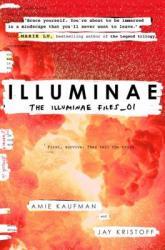
It seems like a typical day on her small, icy planet when Kady breaks up with her boyfriend Ezra. Little does she know, hours later she'll save Ezra's life when a megacorporation attacks their planet. The survivors of the attack are picked up by a passing fleet and Ezra and Kady are separated. As the two teens are trained to fill the staffing gaps on the military fleet, Kady begins to notice that the commanders are hiding a virus on one of the transport vessels which puts the safety of the whole fleet at risk. Soon, Kady finds herself reaching out to Ezra in an attempt to gain more information on the effects of the virus.
Illuminae tells a great story with the right mix of humor, code speak, and action. A unique premise and the authors’ attention to detail lead to a well-developed sci-fi world. The excellent story is enhanced by the inventive format – the novel reads like an investigative report made up of IM conversations, journal entries, and scientific reports.
The interesting format allows for the authors to provide a variety of relatable perspectives. Even though they’re living in a galactic warzone, Ezra and Kady provide a realistic and often humorous picture of a complicated relationship. The authors manage to make their interactions feel realistic despite the fact that Ezra and Kady never inhabit the same physical space at any time in the book. While Ezra and Kady are excellent characters, Kaufman and Kristoff have developed a varied cast of secondary characters which provide humor and empathy to the story.
Illuminae will appeal to a variety of sci-fi fans. It includes elements of intergalactic warfare and intrigue similar to Star Wars, apocalyptic elements along the lines of The Fifth Wave, strong kids and teens as savior figures like Enders Game, and survival instincts and humor along the lines of The Martian. Pick up Illuminae for a funny, fascinating read!

Greta Stuart has been a hostage for most of her life. Well, technically, she's one of the "children of peace". You see, long ago, after the world was ravaged by the effects of global warming, an AI named Talis put himself in control, and decided to almost completely eradicate war by having the leader of each country turn over their heir to be a "child of peace" until the child reached the age of 18. Should that country go to war, the child will be killed. Greta's nation, the Pan Pols (Canada) are about to go to war over water, and Greta knows that her death is imminent.
This book is hard to explain. Basically, the world-building is pretty detailed, but not without some holes (many of which are explained by the end of the book), and most of the first half of the book was spent explaining the world that Greta and her fellow hostages lived in. Also, Greta is the proverbial ice princess - she is fairly stoic, even in her own head, and so I didn't think she was very likable for the first half of the book.
However, as the book progresses, Greta really comes into her own. Her stoicism and propriety have given her a certain amount of power in regards to the fellow children of peace, and it's really fun to see her step up and wield that power. And then, stuff goes terribly, horribly wrong, and the pacing and intrigue of the story really pick up.
I'd give the first half of the book 2 stars, and the second half 5. So, over all, like a 3.5 or something. By the end, I was loving it. If you like really complex dystopian novels (this is more like 1984 than Divergent), then this one is not to be missed.
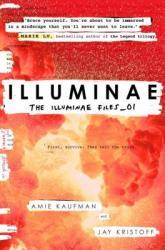
Kady and Ezra are citizens of the Kerenza colony - an illegal mining colony in a remote corner of the universe. One day, the colony comes under attack from rival mining company Beitech. Kady and Ezra manage to escape on two of the three spaceships that survive the attack. Unfortunately, in the process of escaping Kerenza and battling Beitech's ships, the Kerenza ships are massively damaged and unable access their jump drives to escape to the nearest jump station. The remaining Beitech ship is chasing the Kerenza ships through space in order to eliminate ALL survivors from the Kerenza colony.
Illuminae is a collection of the electronic communications between Kady and Ezra juxtaposed with a variety of different things: ship diagrams, dialog between the different ships' commanders, Wikipedia type pages, video
transcripts, thoughts from the AI controlling one of the ships, pictures of victims, etc.
I have really mixed feelings about this one. First, I really enjoyed the layout of the book. I'm not sure that I've read anything quite like it; I guess I would maybe label this as a more modern take on the epistolary
format. Some of the pages (usually when they were in space) were prose set to artwork, which was really cool to see. However, the layout was not easy to read on a kindle - luckily I had the book checked out as both a physical book and an eBook which I would recommend as the book itself is basically an anvil.
I really liked the plot of the first 54% (thanks, eBook!) of the book, and then it went a little off the rails for me. At this point, the book kind of changes from a mystery/exploration of the use of AI to an episode of the
Walking Dead set in space, which is decidedly not my thing. The last half of the book is actionactionaction, which never gives the characters or the readers a chance to breathe. The characters themselves are pretty generic sarcastic teens - I thought they were both pretty funny, but their personalities weren't really developed much beyond the snark. Oh, and the romance. I know I'm not the intended audience, but the romance felt forced, melodramatic, and icky. I skimmed those parts...because gross.
I don't think I'll check out the next book as I was not a fan of the last half of Illuminae, but I did really enjoy the reading experience. I would recommend this to anyone looking for a really unique sci fi read with a
healthy helping of romance. 3 stars. I (mostly) liked it.
Double helix is packed with science, ethics, psychology and relationships. Eli Samuels, 18, can’t get close--not to his caring but preoccupied dad; not to his smart, long-time girlfriend, Viv; and certainly not to his mother, who has been institutionalized for years with a devastating degenerative disease.
Instead of going to college after he graduates high school, Eli decides to apply for a job at the Wyatt Transgenics Lab, a well-known lab for genetic-engineering experiments. Eli’s father is furious when he finds Eli has been hired and demands that Eli reject the job offer, but he won’t say why. Silence is how Eli’s family deals with the unpleasant.
Eli’s long-time girlfriend Viv has never met Eli’s father and has certainly never met Eli’s mother. To do so, Eli would have to reveal that his mother has been institutionalized for years with a devastating degenerative disease. Eli has talents and abilities that he hides from Viv, but somehow his new boss, Dr. Wyatt knows about them from the very beginning. What can make Dr. Wyatt be so fascinated with Eli? And why is Eli’s father so irate? Enter the twists of the Double Helix.
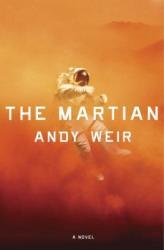
Every moment of this book is stricken with intense worry, suspense and intrigue! I loved every minute of it. Weir never lets you feel confident in how the events pan out, which is stressful to say the list. But that is a good quality of an action novel. It's smart, funny and powerful.
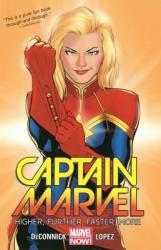
I don't always like the first volume of a graphic novel series as the world-building can be confusing - but I really enjoyed this one! Volume 1 tells a nice story with a beginning, middle and end, and it's a great intro to the Captain Marvel story. Captain Marvel's origin story was rather hilariously told by Kit, a child, in 4 panels at the end of the first issue, and it just sounds nuts. But even with almost no previous exposure to the character, I was immediately hooked and was able to fall in line with Carol Danvers and and her crew with minimum confusion. Also, Danvers has a cat (or possible ferkin). Named Chewie. Be still my heart.
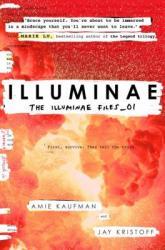
Told through recovered computer documents, Illuminae tells the story of Kady and Ezra fighting to survive after a rival mining company destroys their colony and they and the rest of the survivors are fleeing on an damaged fleet while being pursued by the enemy warship. What follows are pages of IM chats, reports, and emails recovered to tell their story of rebellion and survival. When a mysterious illness starts to affect other refugees, it adds a whole other dimension to this story. This was a such a unique take on science fiction--telling the story through recovered documents as two teens fight the system so they can stay alive and stay together--a fast and exciting read!